Soldiers’ graves in war cemetery in Iraq repaired


Habbaniya War Cemetery, 60 miles west of Baghdad, honours 173 Second World War casualties and 117 who died in conflicts in the late 1940s to 1950s.
Since 1990, it has been unsafe for staff at the Commonwealth War Graves Commission (CWGC) to manage the site due to war and political instability.
Advertisement
Hide AdAdvertisement
Hide AdThe graves gradually deteriorated over time due to the high salt content in the Iraqi ground.
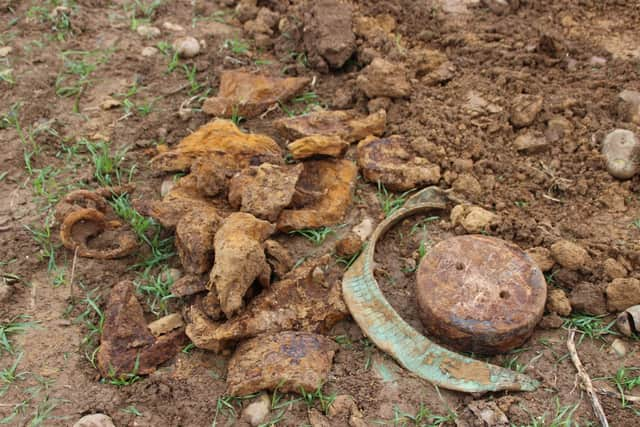

Habbaniya War Cemetery sits inside what is now an Iraqi air base, making it a more secure location to begin repairs.
Following an improvement in the security situation, stonemasons from Beaurains, France, began producing nearly 300 white Portland stone headstones in December last year to transport to Iraq.
Local contractors started work on the ground in March, with the stones now installed and the cemetery restoration on the cusp of completion.
Advertisement
Hide AdAdvertisement
Hide AdThe 1st Bn King’s Own Royal Regiment (Lancaster) was a regular Army unit which was in India when the Second World War broke out in 1939.
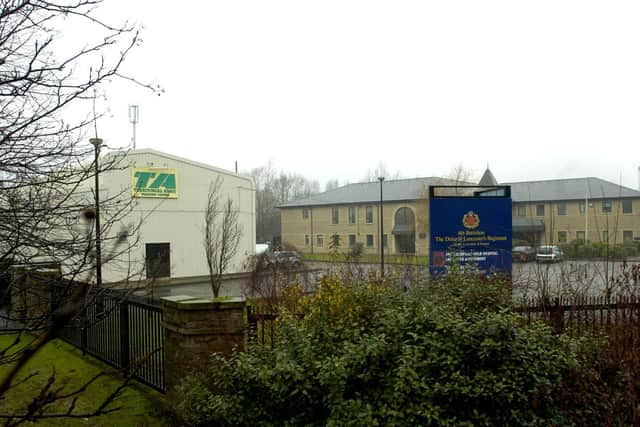

In 1941 350 men from the regiment were airlifted into Iraq to defend the RAF base at Habbaniya - the first British battalion ever to be flown into battle - and helped defeat the Iraqi Army forces who had surrounded it.
Eighteen soldiers from the battalion were killed on the same day during fighting for Fallujah on May 22 1941.
A total of 29 men were lost from the 1st Bn King’s Own Royal Regiment whose garrison headquarters were at Lancaster.
Advertisement
Hide AdAdvertisement
Hide AdThis little-known but vital victory in the Second World War was commemorated in Lancaster.
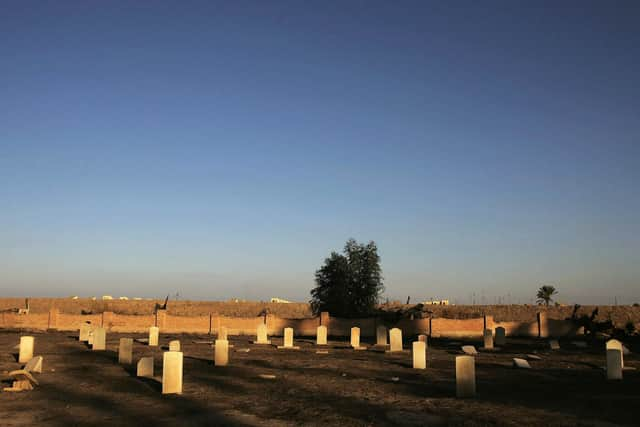

Veterans from the King’s Own Royal Border Regiment marched across the city in a show of remembrance for those who lost their lives in one of Britain’s first major victories of the conflict.
Sixty years ago, members of the regiment were stationed at Habbaniya training airfield in Iraq, when the station was attacked and besieged by the pro-German Iraqi nationalist rebel, Raschid Ali.
The flying school’s training aircraft - mostly a variety of obsolete bi-planes - and retired guns used in the First World War - were assembled to fight the highly superior Iraqi attack.
Advertisement
Hide AdAdvertisement
Hide AdIn a remarkable show of bravery the battle was won and the Iraqi oilfields saved from the clutches of the Germans.
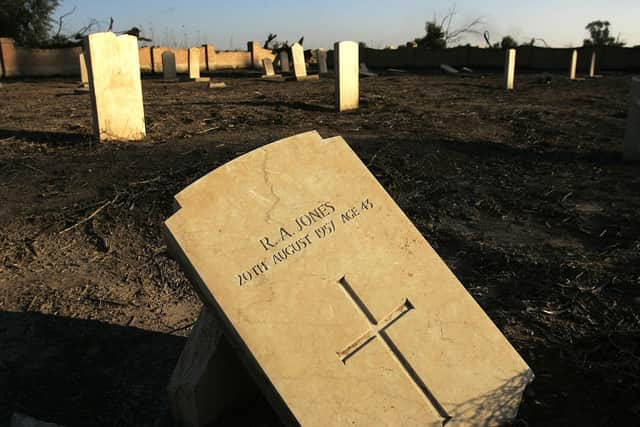

Peter Donnelly of Lancaster Military Museum said: “People know about Dunkirk and other famous battles but few realise that men - and, indeed, women and children from the Borders - were involved in the first major victory of the war.
“If they had fallen, the Germans would have had all the oil and been able to attack Palestine and Egypt.
“Many people from around here were involved.”
The soldiers of the 1st Bn King’s Own Royal Regiment came from all over the UK but were mainly drawn from the North West.
Advertisement
Hide AdAdvertisement
Hide AdThe following soldiers are buried in Habbaniya War Cemetery, Iraq:
Joseph John Short, Private, 3711233, 1st Bn, King’s Own Royal Regiment (Lancaster) who died on Tuesday, May 6, 1941. Age 24.
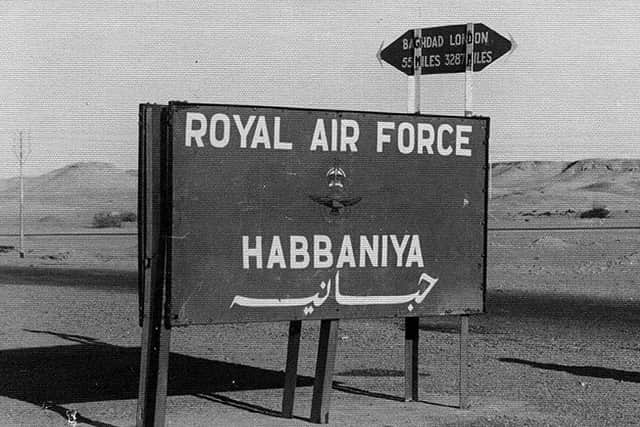

Nicholas Fitzpatrick, Private, 3711898, 1st Bn, King’s Own Royal Regiment (Lancaster) who died on Tuesday, May 6 1941. Age 24.
William Butler, Private, 3710391, 1st Bn, King’s Own Royal Regiment (Lancaster) who died on Tuesday, May 6, 1941. Age 27.
Advertisement
Hide AdAdvertisement
Hide AdWilliam Campbell, Private, 3710829, 1st Bn, King’s Own Royal Regiment (Lancaster), who died on Tuesday, May 6 1941. Age 28.
Vincent Rogers, Private, 3710363, 1st Bn, King’s Own Royal Regiment (Lancaster), who died on Tuesday, May 6, 1941.
John Thompson, Lieutenant, 182495, King’s Own Royal Regiment (Lancaster) who died on Tuesday, May 6 1941.
William Levell, Private, 3712869, 1st Bn, King’s Own Royal Regiment (Lancaster) who died on Wednesday, May 7 1941. Age 22. Patrick Harry Freke Evans, Major, 34763, King’s Own Royal Regiment (Lancaster) who died on, Tuesday, May 20 1941. Age 35.
Advertisement
Hide AdAdvertisement
Hide AdWalter Fleming, Private, 3710998, 1st Bn, King’s Own Royal Regiment (Lancaster) who died on Thursday, May 22 1941. Age 32.
John Douglas Benson, Private, 3713018, 1st Bn, King’s Own Royal Regiment (Lancaster) who died on Thursday, May 22 1941. Age 22.
John Joseph Rooney, Private, 3711197, 1st Bn. King’s Own Royal Regiment (Lancaster) who died on, Friday, May 2 1941. Age 26.
John Adshead, Private, 852852, 1st Bn, King’s Own Royal Regiment (Lancaster) who died on Friday, May 2 1941. Age 25.
Advertisement
Hide AdAdvertisement
Hide AdErnest Isaac Classon, Lance Corporal, 3713047, 1st Bn., King’s Own Royal Regiment (Lancaster), who died on Thursday, May 22 1941. Age 22.
Leslie Gabbert, Private, 3711135, 1st Bn, King’s Own Royal Regiment (Lancaster) who died on Thursday, May 22 1941. Age 24.
Richard Jones, Private, 3711483, 1st Bn, King’s Own Royal Regiment (Lancaster) who died on Thursday, May 22 1941. Age 24.
Clifford Wilson, Private, 3710956, 1st Bn, King’s Own Royal Regiment (Lancaster) who died on Thursday, May 22 1941. Age 25. Robert Wilson, Private, 3713245, 1st Bn, King’s Own Royal Regiment (Lancaster) who died on Thursday, May 22 1941. Age 22.
Advertisement
Hide AdAdvertisement
Hide AdChristopher John Hodgson, Second Lieutenant, 117308, 1st Bn, King’s Own Royal Regiment (Lancaster) who died on Thursday, May 22 1941. Age 20.
William George Jones, Private, 3710964, 1st Bn, King’s Own Royal Regiment (Lancaster) who died on, Thursday, May 22 1941.
George Bilsborrow, Private, 3712942, 1st Bn, King’s Own Royal Regiment (Lancaster) who died on Thursday, May 22 1941. Age 22.
Frank Vallery, Private, 3710475, 1st Bn, King’s Own Royal Regiment (Lancaster) who died on Thursday, May 22 1941.
Advertisement
Hide AdAdvertisement
Hide AdJohn Leo Yates, Private, 3856081, 1st Bn., King’s Own Royal Regiment (Lancaster) who died on Thursday, May 22 1941. Age 24.
William Kirby, Lance Corporal, 3713119, 1st Bn, King’s Own Royal Regiment (Lancaster) who died on Thursday, May 22 1941.
George Alfred Owen, Private, 4799947, 1st Bn, King’s Own Royal Regiment (Lancaster) who died on Thursday, May 22 1941. Age 28.
John Quinn, Lance Corporal, 3713463, 1st Bn, King’s Own Royal Regiment (Lancaster), who died on, Thursday, May 22 1941.
Advertisement
Hide AdAdvertisement
Hide AdJohn Maguire, Warrant Officer Class II, 3710261, C.S.M. 1st Bn., King’s Own Royal Regiment (Lancaster) who died on Thursday, May 22 1941. Age 26.
William Smith, Private, 3711595, King’s Own Royal Regiment (Lancaster) who died on Thursday, May 22 1941. Age 23.
John McNulty, Private, 3446351, 1st Bn, King’s Own Royal Regiment (Lancaster) who died on Thursday, May 22 1941. Age 22.
Frederick William (Fred) Bailey, Lance Corporal, 3712915, 1st Bn, King’s Own Royal Regiment (Lancaster), who died on Tuesday, July 8 1941. Age 23.
Advertisement
Hide AdAdvertisement
Hide AdThere is a Habbaniya Memorial now displayed within Alexandra Barracks, Caton Road in Lancaster, although it originally was located at the Royal Air Force Club in Preston, where is was officially unveiled on April 26 1958.
The plaque reads, “To the memory of all ranks of the King’s Own Royal Regiment and Royal Air Force Killed in Action in Iraq 1941.”
In its absence from Iraq, the CWGC created two commemorative books that form the Iraq Roll of Honour which contain more than 54,000 names.
CWGC staff maintain sites from the battlefields of France and Flanders, Belgium, to countries such as Egypt and Canada.
Advertisement
Hide AdAdvertisement
Hide AdThe organisation has recently launched its To The Four Corners campaign to highlight its global work.
Visitors to its website will be able to read staff diaries, take virtual tours of cemeteries and read stories from the CWGC archives. For more details visit www.cwgc.org/.